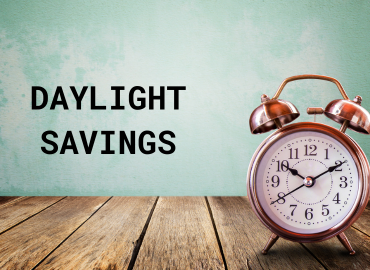Daylight Savings Time
What is daylight savings time and why do we have it? Daylight savings time (DST) is a one-hour adjustment used twice yearly in the United States and some other nations like Canada, Egypt, and Cuba. Arizona and Hawaii are the only states in the USA that do not use DST.
Clocks are set to an hour later at 2 a.m. on the second Sunday in March, called “spring forward.” In 2024, that’s March 10th. Clocks are set an hour earlier on the first Sunday in November, called “fall back.” In 2024, that’s November 3rd.
Who came up with DST? Some say it was Benjamin Franklin, others say it was George Hudson or William Willet. Some believe the choice to change the time twice a year was made at the behest of farmers to adjust their work to make the most of daylight hours. Germany was the first nation to adopt daylight savings time to reduce fuel consumption in 1916. The United States started officially using DST in 1918 when the Standard Time Act was signed by President Woodrow Wilson.
Many people have raised doubts as to whether or not DST is useful anymore. In fact, DST has some harmful effects. During the workweek following “spring forward,” fatal car accidents in the United States increase by 6% according to a 2020 study by researchers at the University of Colorado, Boulder. We
don’t have a number for how “spring forward” affects non-fatal car accidents. Risk increases the further west one lives.
Losing an hour of sleep often causes people to feel groggy and distracted, with delayed reaction times. It’s more than just an hour of sleep, too. If someone has a daily routine, an hour’s change can upset their circadian rhythm. A tired or disoriented driver can easily cause the same problems as an intoxicated driver. Also, a link has been found between “spring forward” and a higher short-term likelihood of emergency room visits, strokes, and heart attacks.
There are some things you can do to better handle DST in March, before or after “spring forward.” First, simply be aware. Thankully, many of us today have devices like smartphones that will change the time on their own, but it’s easy to forget when DST is to take effect. To help deal with the time shift, set alarms earlier by increments of, say, 15 or 30 minutes. Try doing other things earlier too, like errands and meals. Also, watch your caffeine and alcohol consumption. Drink water instead, or beverages like unsweetened green tea. It’s always a good idea to pay attention to your body and listen to what it’s asking for.
If you’re feeling like it’s “spring forward” all the time, talk to your doctor. They can run physical tests and make recommendations for further treatment. If you also feel emotionally tired, distracted, and can’t find joy, we can help. We offer full metabolic workups, psychiatry services, therapy, and more. Give us a
call at (585) 442-6960 or contact us on our website.



